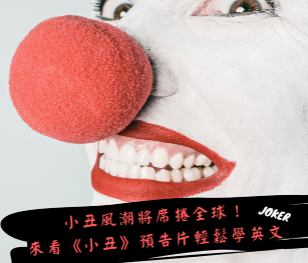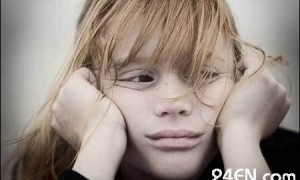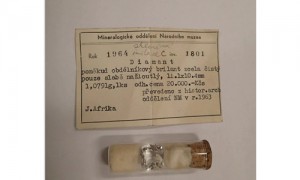I was “gonna” be a comedian. 我「要」当一个喜剧演员
在预告片中完整的句子为:
When I was a little boy and told people I was gonna be a comedian, everyone laughed at me.
我小时候跟大家说我以后要当一个喜剧演员,大家都笑我。
(be) gonna 其实就等于 (be) going to「将要…;要…」的意思,是口语上的缩写。很多时候,在口语的时候 gonna 出现的频率会比 going to 要高上许多。
A: Hey, I am gonna go watch the movie “Joker” tonight with Rachel; do you want to come with us?
B: Nah, but thanks. I have a big exam coming tomorrow.
A: 嘿,我今晚要和 Rachel 去电影院看《小丑》,你要去吗?
B: 不,谢啦。但我明天有大考。
在这里小 V 顺便帮大家补充一些常见的口语缩写:
❄ wanna = want to (想要)
❄ hafta = have to (必须)
❄ gotta = got to (必须)
❄ sorta = sort of = kind of (一点点)

You can say that again. 你说得没错
You can say that again. 可不是「你再说一遍」,而是「你说得没错」的意思。字面感觉是叫人再说一次,可以想像如果你叫对方再说一次,那是不是就代表你很同意对方说的话而想请对方再说一次呢?这句片语是用在当你完全同意他人的想法时,用来表示极度赞同。
A: I think the latest season of “Stranger Things” is great.
B: You can say that again. Let’s watch it again some time!
A: 我觉得最新一季的《怪奇物语》超赞的。
B: 你说得没错!我们有空再看一次吧!
在这里,小 V 又要来鸡婆的补充一些英语里常见的口语赞同或反对的说法啦!
常见表示赞同的说法:
❄ Exactly. (没错)
❄ You’re absolutely right. (你说得太对了)
❄ I think so too. (我也这么想)
❄ I couldn’t agree more. (我非常同意)
❄ I agree. (我同意)
常见表示反对的说法:
❄ I don’t think so. (我不这么想)
❄ I disagree. (我反对)
❄ I take a different view. (我有不同想法)
❄ I don’t share your view. (我与你看法不一)
You don’t listen. 你没在听
当别人跟你说 You don’t listen. 的时候可不是叫你不要听或是不能听喔。 You don’t listen 的意思其实是在抱怨对方根本没在听你说话。
A: Come on. Let’s go play basketball with Joey.
B: You don’t listen, do you? I said I have a big exam coming tomorrow!
A: 走啦,我们去跟 Joey 打篮球。
B: 你没在听对吧?我说过我明天有大考!
那小 V 在这里补充另一个很像的片语是 You don’t say.。它的意思可不是叫你不要说话哦,而是「真的吗?;可不是吗?」,放在不同的情境就会有不同的意思。
第一种情况是表示惊讶:
A: Yesterday, I ran into Katy Perry when I was shopping at Taipei 101!
B: You don’t say!
A: 昨天,我在 101 逛街的时候遇到 Katy Perry!
B: 真的假的!
第二种则是用来表示讽刺,通常会用在讽刺某人讲出了一个「非常明显」的事实明显到根本不用说的情况。
A: Do you guys know that there are seven colors in a rainbow?
B: You don’t say.
A: 你们知道彩虹有七种颜色吗?
B: 可不是吗?
“check out” this guy 「看看」这家伙
check 本身有「检查:核对」的意思,加上介系词 out 形成动词片语 check out,check out sb./sth. 有「看看…」的意思。
A: Check out this cat! It is swimming!
B: Oh my god! This is the cutest thing I’ve ever seen!
A: 来看这只猫,它在游泳欸!
B: 天啊!这是我看过最可爱的东西!
check out 也可当「检查」来使用。
I had my car checked out by a mechanic last weekend.
我上周把我的车牵去给师傅检查。
当我们把空格拿掉,变成一个字 checkout 的时候,意思可就完全不一样啰!这时候的 checkout 为名词,意思是「结帐的地方」。
A: Where’s the checkout? I can’t see one here.
B: Go straight to the end, then turn right. It’s on your left-hand side.
A: 柜台在哪?我在这边都没看到。
B: 直走到底,然后右转,它会在你的左手边。
二、单字
接下来小 V 想要帮大家补充一些在预告片里面出现的单字。
awful 糟的
awful 为形容词,意思是「可怕的;使人敬畏的;极糟的;非常的」。当「可怕的,吓人的」时,同义词有 brutal、frightful、fearful。
The movie was awful. We should not have chosen that one.
这电影糟透了,我们不该选那部的。
bother 烦扰
bother 在此处的意思为「烦扰、打搅」。另外它也有「使恼怒;使困惑」的意思。
My mom always bothers me with her trivial affairs.
我妈总是拿她的小事来打扰我。
pal 朋友
pal 是「朋友;伙伴」的口语说法,最相近的近义词就是 buddy、friend。
Hey, pal. What are you doing tonight? Wanna hang?
嘿兄弟,今晚有事吗?要不要出去晃晃?
其他常见的和朋友相关的说法有:
❄ nodding acquaintance (泛泛之交)
❄ bestie (挚友)
❄ toxic friend (坏朋友)







